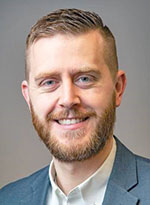A Journey of Dignity / Elliott Bedford
Death, fear and Christian hope in the time of COVID-19
 (This quarterly column is a collaboration of the archdiocesan Office of Human Life and Dignity, Ascension St. Vincent and Franciscan Health.)
(This quarterly column is a collaboration of the archdiocesan Office of Human Life and Dignity, Ascension St. Vincent and Franciscan Health.)
The actor Jerry Seinfeld once observed that people’s number one fear is public speaking; it even outranked the fear of death. That meant, Seinfeld joked, that at a funeral, people would rather occupy the casket than give the eulogy.
Despite being second in the poll, the fear of death is still very real and very prevalent. Look no further than the recent COVID-19 pandemic to see how such fear can significantly impact our thoughts, relationships and actions, as individuals and as a society. Just the other day, I saw several people driving in their respective cars, alone, wearing a breathing mask and rubber gloves. Further down the road, I saw a man out for a jog, by himself, wearing a surgical mask. Let’s set aside the question of whether such measures are necessary or even helpful: at the very least, they illustrate how thoroughly our world has changed for fear of the virus.
Consider the way we tend to speak about death and the fear it evokes. A recent article in The New York Times from Theresa Brown, a former hospice nurse, illustrates the point well. She writes: “Even though we are all going to die, death fits uneasily into the world of health care. Fundamentally, health and healing apply to the living, not the dying or the dead, and helping the living get better is why most nurses and doctors got into this work. When I worked in oncology, I saw this principle acted out by physicians who viewed death as failure, and nurses who equated talking honestly about bad prognoses with destroying patients’ hope.” Let me put this point about our mental and linguistic model another way: if we think we are at war with physical death, illness and suffering, if we make them our enemy in a zero-sum game, then medicine and technology become our arsenal, our means of salvation from the enemy. And it’s still a war we will all lose.
Now let’s consider Brown’s perspective, learned from her experience in hospice: “I accept death. I accept its inevitability, but also its importance. Death is the end of each person’s time on Earth; it is a privilege to care for people in that moment. I embrace the cycle of life while recognizing the sadness of every death.” The Church takes this view as its starting point, especially in its teaching around advance care planning, end-of-life care, palliative care and hospice. In short, as Catholic Christians, we should treat death as a fact, something to be acknowledged. This helps temper the fear death causes.
Consider how this view finds its practical expression in the hospice approach to mortality. In Brown’s words: “Hospice care approaches death very differently. Practicing as a nurse in home hospice, I understood that patients were going to die. The goal was for them to have the best life possible for as long as possible and to die with minimal distress. Some people associate hospice with ‘giving up’ on dying patients, but that is mistaken. Hospice staff do not hurry death along. Rather, hospice clinicians concede that curative treatment either does not exist for, or has been declined by the patient, and accept that patients will die under hospice care.” This same mentality is also at the heart of palliative care, which supports patients with serious illnesses—physically, mentally and spiritually—throughout their disease progression.
Palliative care and hospice are therefore resources, which the archdiocese is admirably taking responsibility to promote and advocate, that help put the Church’s teaching into practice. They can help you and me live out the Church’s teaching. In this way, the Church not only teaches the truth of salvific hope in Jesus’ resurrection, she helps us live out that life in very practical and charitable ways.
In this way, the Church provides a full response to the fear of death even during a pandemic.
(Elliott Bedford is the director of Ethics Integration for Ascension Indiana in Indianapolis and a member of the Hospice and Palliative Care Initiative, a collaborative initiative between the Archdiocese of Indianapolis, Ascension
St. Vincent and Franciscan Health.) †
 (This quarterly column is a collaboration of the archdiocesan Office of Human Life and Dignity, Ascension St. Vincent and Franciscan Health.)
(This quarterly column is a collaboration of the archdiocesan Office of Human Life and Dignity, Ascension St. Vincent and Franciscan Health.)